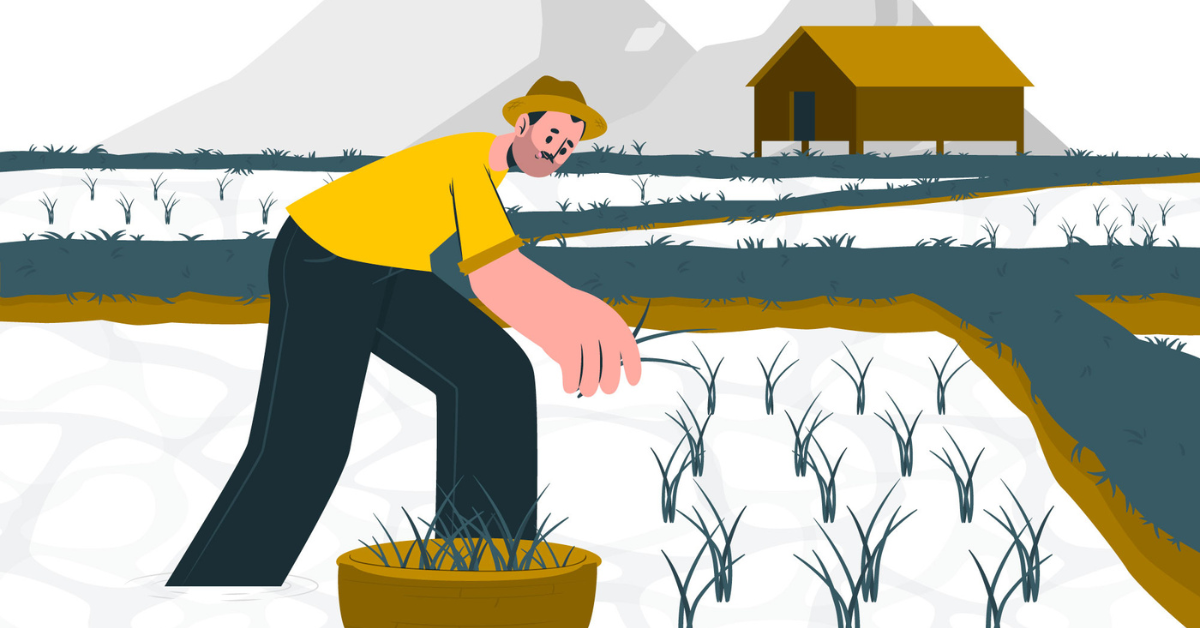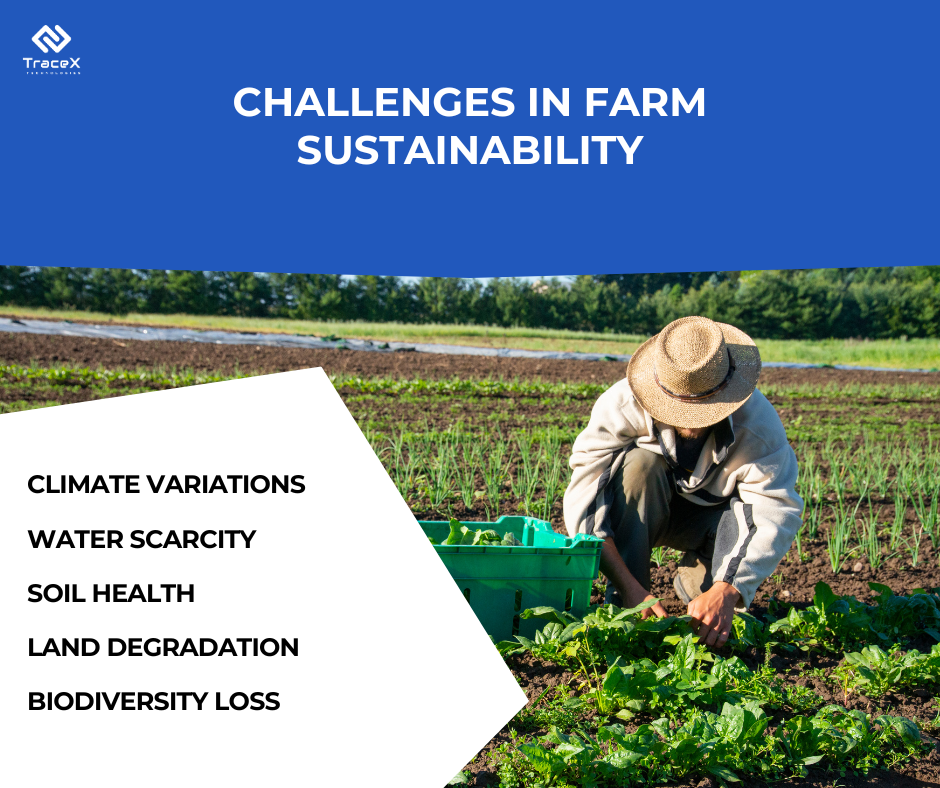Contact: +91 99725 24322 |
Menu
Menu
Quick summary: Discover how Australian farmers are leading the charge in sustainable agriculture practices. From regenerative farming to water management, explore the innovative strategies shaping farm sustainability Down Under.

Farm sustainability in Australia is deeply ingrained within the national ethos, with the country placing significant emphasis on preserving natural resources, supporting rural communities, and ensuring food security. Recognizing the critical role it plays, farm sustainability is a cornerstone of Australian agricultural practices.
From the fertile fields of the Murray-Darling Basin to the sprawling cattle stations of the Outback, Australian farmers are dedicated stewards of the land, implementing sustainable practices to protect the environment and enhance the long-term viability of their operations.
At the core of Australian agriculture lies a commitment to sustainability. This entails responsibly managing the environment, caring for people and animals, and fostering economic resilience within communities and industries.
Farm sustainability refers to practices that prioritise environmental care, economic viability, and social responsibility. It entails using approaches that preserve or improve land production while minimising negative effects on ecosystems and populations. This involves using renewable energy, managing water efficiently, conserving soil, and implementing biodiversity preservation initiatives.
Sustainability in agriculture is critical for guaranteeing long-term food security, conserving natural resources, and combating climate change. Farmers who use sustainable practices can reduce their reliance on toxic pesticides, conserve water, protect soil health, and encourage biodiversity. Furthermore, sustainable farming methods frequently boost resistance to environmental issues while also providing economic benefits such as cost savings, expanded market options, and greater community well-being. Overall, prioritising sustainability in agriculture is critical for present and future generations.
Australia, known for its extreme climatic conditions like droughts and floods, remains a vital player in the global agricultural landscape. Grazing livestock and cereal grain production serve as the backbone of its export economy. Blessed with vast grasslands, fertile soil, and the extensive Murray-Darling Basin, Australia boasts favourable conditions for both irrigated cropping and grazing activities. To combat the uncertainties posed by erratic weather patterns, Australian farmers are increasingly embracing regenerative agriculture practices.
Government initiatives incentivize tree planting and vegetation restoration to sequester carbon in fallow fields. Moreover, farmers are recognizing the resilience of native pastures and grasses in drought conditions, leveraging their deep-rooted structures to sequester carbon and enhance soil nutrient cycling. Embracing sustainable strategies like rotational grazing, farmers manage their grazing stock more efficiently, allowing their land to recover and preventing desertification caused by drought and overgrazing.
Concerns about environmental deterioration and climate change have fuelled a significant shift towards sustainable farming practices in recent years. This transition has resulted in the implementation of innovative strategies aimed at increasing resource efficiency and lowering the industry’s environmental imprint.
Farmers are increasingly employing sustainable practices such as precision agriculture, organic farming, and agroforestry to address these difficulties and maintain the long-term survival of their businesses.
Learn how innovative solutions can help optimize resource usage, enhance soil health, and promote environmentally responsible practices for a more sustainable future in agriculture.
Dive in now and unlock the key to successful and eco-friendly farming!
The water management practices discussed in the provided sources demonstrate Australia’s dedication to sustainable farming. Drip irrigation, rainwater harvesting, and precision irrigation technologies are widely used. These strategies optimise water use, reduce waste, and increase agricultural output. Furthermore, novel approaches such as soil moisture sensors and computerised irrigation scheduling provide optimal water distribution, reducing drought risk and conserving water resources for future generations.
Australian farming prioritises soil health and fertility. Conservation tillage, cover cropping, and rotational grazing are all common practices. These strategies reduce soil erosion, increase organic matter, and improve nutrient retention. Farmers who practise no-till farming limit soil disturbance, which promotes soil structure stability and carbon sequestration. By combining these strategies, Australian farmers enhance sustainable land use and agricultural productivity.
Biodiversity conservation projects demonstrate Australian farmers’ commitment to protecting natural ecosystems. Agroforestry, habitat restoration, and wildlife-friendly farming all contribute to the creation of diversified landscapes that support local fauna and plants. Farmers use wildlife corridors and buffer zones to reduce habitat fragmentation and promote species resilience. By implementing integrated pest management practices, companies lessen their dependency on pesticides, promoting healthy ecosystems. These projects help Australian farmers conserve biodiversity, promote ecological resilience, and ensure long-term agricultural viability.
Financial management strategies in sustainable farming in Australia are critical to long-term profitability. Farmers optimise resources by budgeting, cost control, and investment in efficient technologies. This involves embracing alternative energy solutions, such as solar panels or wind turbines, to lower long-term operating expenses.
Furthermore, comprehensive monitoring of expenses and revenues enables informed decision-making, assuring profitability while minimising environmental effect.
Diversifying income sources is a fundamental approach used by Australian sustainable farmers to reduce risks and increase resilience. Aside from traditional agricultural or livestock production, they look into additional revenue streams such as agri-tourism, farm stays, and on-farm workshops. Farmers who diversify can distribute their revenue across numerous operations, minimising their sensitivity to market changes and climate-related issues. This approach not only provides financial stability but also fosters community engagement and enhances the farm’s overall sustainability.
Sustainable farming practices in Australia allow market access and value-added products. Farmers prioritise high-quality, ethically sourced products that appeal to conscious consumers both domestically and abroad. Farmers can take a higher portion of the retail price by selling directly to consumers at farmers’ markets or through online platforms, avoiding intermediaries. Furthermore, value-added products such as organic or specialty items attract higher pricing, which boosts profitability and fosters brand loyalty. Collaborations with local enterprises or cooperatives increase market reach, assuring consistent demand for sustainable agricultural products.
Australian farmers are progressively adopting sustainable farming practices, resulting in significant community engagement and support. Farmers are strengthening links with their communities through initiatives such as farmer’s markets, educational programmes, and community outreach events. Farmers foster trust and support in their communities by transparently revealing their sustainable techniques, such as regenerative agriculture and water saving strategies. This interaction not only promotes knowledge about the need of sustainable farming, but it also provides opportunities for consumers to actively support local agriculture, resulting in a more resilient and connected community.
In Australia, sustainable farming prioritises fair labour practices and worker wellbeing. Farms that use sustainable practices frequently provide improved working conditions, fair salaries, and possibilities for skill growth and progress. Farmers who invest in their personnel get higher levels of productivity and job satisfaction. Furthermore, sustainable farming practices including reduced chemical use and ergonomic farming techniques help to create a safer and better work environment for agricultural workers, indicating a commitment to labour practices that prioritise both people and the environment.
Sustainable farming in Australia is increasingly using Indigenous land management methods, recognising Indigenous cultures’ deep ecological expertise. Farmers strengthen the resilience of their lands and ecosystems by incorporating traditional knowledge such as controlled burning, rotational grazing, and native plant agriculture. Collaboration with Indigenous communities not only promotes cultural preservation and reconciliation, but also leads to more effective and sustainable land management practices. This inclusive strategy not only benefits the environment, but it also promotes mutual respect and understanding between farmers and Indigenous communities, opening the path for more comprehensive and equitable land stewardship.
Delve into strategies for transparent sourcing, ethical practices, and sustainable supply chain management.
Unlock the secrets to responsible agriculture supply chains

Australian farmers are embracing technology to improve their sustainable farming techniques. From automated irrigation systems to crop monitoring drones, technology adoption is critical. This promotes efficient resource management, reduces environmental impact, and increases yield.
Precision agriculture innovations are transforming Australia’s farming ways. Farmers may precisely modify inputs using advanced sensors, GPS-guided machinery, and data analytics, thereby optimising resource consumption and reducing waste. This leads to greater productivity and profitability while reducing environmental deterioration.
Technology has a major impact on farm sustainability. It improves operations, decreases dependency on hazardous chemicals, and saves resources such as water and energy. Furthermore, by encouraging precision and efficiency, technology promotes long-term environmental stewardship, ensuring that Australian farms remain productive and resilient in the face of adversity.
Farm management solutions from TraceX offer a suite of tools and features designed to promote sustainable agriculture practices in Australia. These solutions provide farmers with real-time insights into crop behavior, soil health, and environmental conditions, enabling them to make data-driven decisions that optimize resource usage and minimize environmental impact. By monitoring water usage, nutrient levels, and pest activity, TraceX helps farmers implement precision farming techniques that conserve water, reduce chemical inputs, and enhance soil fertility. Additionally, TraceX facilitates traceability and transparency throughout the supply chain, allowing farmers to track the origin of their products and verify sustainable practices. By promoting efficient resource management and environmentally responsible farming practices, TraceX empowers Australian farmers to achieve long-term sustainability and resilience in the face of climate change and other challenges.
Precision agriculture technology, such as IoT sensors and drones, are emerging trends and opportunities in farm sustainability, allowing for more efficient resource utilisation. Vertical farming and controlled environment agriculture provide year-round output while minimising environmental effect. Agroforestry practices, which incorporate trees into farming systems, promote biodiversity and carbon sequestration. Furthermore, regenerative agricultural practices prioritise soil health, increasing resilience to climate change and raising yields in a sustainable manner.
Potential constraints and areas for improvement include high initial investment costs for sustainable technology, restricted access to education and training, and regulatory hurdles for implementing new practices. Water scarcity and land degradation remain major challenges, necessitating novel approaches to sustainable management.
Farmers, government organisations, researchers, and consumers all play important roles in achieving sustainable goals. Collaboration is vital for knowledge sharing, policy development, and financial incentives to promote sustainable practices. Consumer demand for ethically produced food pushes the market towards sustainability, impacting supply chain practices and agricultural policies. Collaboration among stakeholders can promote systemic change towards a more sustainable farming industry.
In conclusion, farm sustainability in Australia is not just a noble pursuit; it’s a necessity for the future of agriculture in the country. With its diverse climate and unique challenges, Australian farmers are increasingly embracing innovative practices to ensure the long-term viability of their operations. From regenerative agriculture to responsible water management and carbon sequestration initiatives, farmers are leading the way in sustainable practices. By prioritizing sustainability, Australia can not only safeguard its natural resources and rural communities but also continue to thrive in the face of environmental uncertainties. Together, let’s support and celebrate the efforts of Australian farmers in building a more sustainable and resilient agricultural sector for generations to come.
